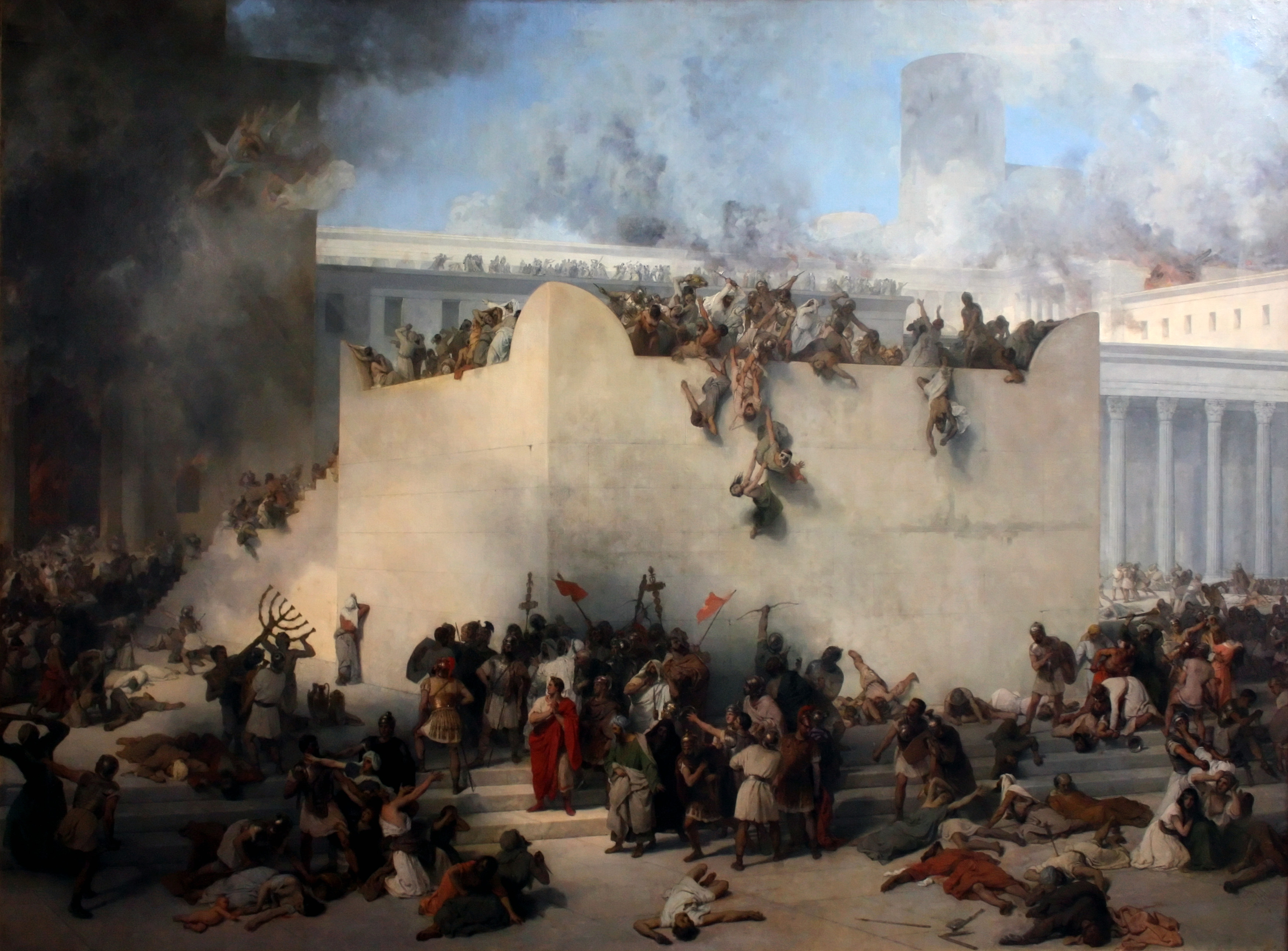Countless places of worship have been destroyed throughout history. Churches, mosques, synagogues and other types of sacred “temples” were always targets during war, persecution or even sectarian infighting. But only one such event reverbated across the centuries, to the point that we are still dealing with its consequences, and that is the Second Temple of Jerusalem, destroyed during the Roman rule. One step towards understanding that event is to survey how the Roman Emperors viewed the Jewish people until that fateful moment:
Julius Caesar (reigned 49 BC – 44 BC)
- He was the last ruler of the Roman Republic. Jews, who had coexisted with other communities in Rome since the second century BC, still lived in relative peace under Julius Caesar.
After the assassination of Julius Caesar, the Empire was ruled by a triumvirate (an alliance of three men) of Marc Antony, Marcus Lepidus and Octavian (future emperor of the empire under the name of Augustus).
Augustus (r. 27 BC – 14 AD)
- He was the first emperor of the Roman Empire. He ordered an empire-wide census at time of Jesus’ birth in the Gospel of Luke. The brilliant initiative Pax Romana was under his reign. The month of August is named after him. Jews continued to live in peace in his empire and were even “favorably treated.”
Tiberius (r. 14 AD – 37 AD)
- Under his reign and the authority of Pontius Pilate in Judea, Jesus Christ was tried and executed. Back in Rome, in 19 AD, Tiberius banished all Jews from Rome. It is possible that during his reign that the emerging Jewish “cult of Jesus” planted seeds of future bloody strife for both Jews and Christians.
Caligula (r. 37 AD – 41 AD)
- His legacy include stories about orgies and arbitrary executions for entertainment. Many of the scandalous fables might not be true but he was an incompetent emperor and a cruel tyrant. He was eventually assassinated. He viewed the Jews with mistrust and during his reign the rift between the Roman rulers and the Jews was obvious that, perhaps for the first time, it became clear that there are signs of a crisis brewing.
Claudius (r. 41 AD – 54 AD)
- He was an efficient administrator of the empire who successfully added Britain as a province. Jews lived in peace under his reign. He reaffirmed their rights throughout the empire. In the Book of Acts, there is a mention of his expulsion of all Jews from Rome however the details are unclear and the story is mostly largely doubtful. He might have possibly reacted against certain “missionaries” of the new Jewish sect (Christians).
Nero (r. 54 AD – 68 AD)
- Nero was one of the most hated rulers of the Roman Empire. He was known for debauchery and sadistic cruelty. To break free from his mother’s domineering involvement, he had her killed. He also had his wife killed after giving him an heir. His passion for music was behind a rumour that he played a fiddle (or a lyre) while Rome was burning in 64 AD. Although there was speculation that Nero burned down his city, there is no evidence to back it up. However he picked the small sect of Christians as a scapegoat, blaming them for the destruction and inflicted on them horrible persecution. He had them rounded up and burned alive or torn apart by wild animals. While the state of affairs were getting worse in the empire, Nero was touring Greece and enjoying musical performances. His military lost a war with Parthia (58–63 AD) over the annexation of Armenia. There were also revolts in Britain and Judea. The Judean rebellion of 67 AD near the end of his reign would lead to devastating results in Jerusalem three years later. The senate turned up against him and he was declared an enemy of the people. He knew his execution, if arrested, was imminent, so he committed suicide.
After the fall of Nero comes the Year of the Four Emperors, that is 68 AD. None of them lasted more than a few months except the fourth Vespasian (below). Two were murdered and one committed suicide.
Vespasian (r. 69 AD – 79 AD)
- Historical sources do not indicate that Christians were pursued or persecuted under Vespasian. They were probably left in peace. (That would not last long!) But the Jews faced a different fate. To crush a Jewish rebellion, Nero had sent the general, and future emperor, Vespasian in 67 AD. The second-in-command was Vespasian’s son, and also a future emperor, Titus. When Vespasian became the Roman Emperor, he left behind his son in charge. Eventually, in 70 AD, the Roman soldiers besieged, captured and destroyed the walled city of Jerusalem, one of the most glorious cities of the East. The Temple, that was at the heart of Jewish worship, was also destroyed. Among the remains that one could still find today is the Western Wall, or the Wailing Wall. Tens of thousands perished in the entire Jewish-Roman conflict, from both sides, as it lasted from 66–73 AD. Most of the local population were either killed or banished into the Jewish diaspora.
So where the Romans officially anti-Semitic?
The importance of that questions lies in the modern pursuit of digging for the roots of Jewish persecution in Europe that ended up in the Holocaust in the 20th century. While some scholars point out that it all started in the Empire, the truth might be more complicated. Although it seems like from the early decades of the Empire, there was animosity between the Romans and the Jews, there is no evidence that it was a consistent and universal policy. For example, the Jews in the diaspora under the Roman rule always enjoyed more rights than the Judean Jews.
Earlier Roman measures concerning the Jews can likewise not be said to reflect an ideology of intolerance. Julius Caesar, the great benefactor of the Jews, had doubled taxation in kind in Judea, but this was not a specifically anti-Jewish measure. Little less than a century later, Claudius confirmed the existing rights of the Jewish community of Alexandria in 41 C.E. but abolished the last remnants of the Jewish state following the death of Agrippa I three years later. Again, decisions like these were reached on the basis of administrative concerns. They were not influenced by pro- or anti-Jewish sentiments, but must rather be seen within the larger framework of the ruling of the empire.1Karl P. Donfried and Peter Richardson, Judaism and Christianity in First-Century Rome (Grand Rapids, MI: Wm. B. Eerdmans Publishing, 1998), 113.
Also, scholars point out that the Romans suppressed other religions and other rebellions outside of Judea. One famous example is the persecution of Christianity. However the lack of policy does not mean that most Romans were tolerant of the Jews.
Why was there hostility between the Romans and the Jews?
Living in peace in the diaspora or the lack of systemic persecution of the Jews did not mean that they were accepted in the Roman society. Perhaps the Romans resented the Jewish monotheistic religion, in contrast with their own, and their refusal to participate in pagan rituals and imperial cult (emperor worship). The Romans, like the Greeks before them, viewed some of the Jewish cultural practices as barbaric, particularly circumcision of male infants. In Judea, matters were worse, the population was prone to rebellions due to heavy taxation by the Romans and their longing for self rule. They detested that the Romans spent the taxes collected on building pagan temples in their home city. The end result of that troublesome relationship was the destruction of the Jewish holy city and sowing the seeds of a crisis with which we still deal to this day in the Middle East.
Endnotes




